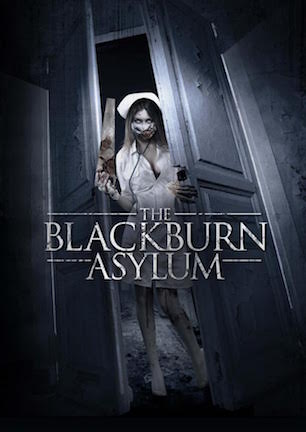Studio: Raven Banner Entertainment
Director: Lauro Chartrand
Writer: Natasha Baron
Producer: Natasha Baron, John Sereda
Stars: Calum Worthy, Zack Peladeau, Sarah Lind, Alexander Calvert, Joyce Robbins, Jacqueline Robbins, Maja Aro, Ken Kirzinger, Brad Loree, Brandi Alexander, Lochlyn Munro, Emilie Ullerup
Review Score:
Summary:
A group of stranded college friends finds an old mine populated by deformed and demented inmates from an abandoned asylum.
Review:
Territorial marketing needs and differences in international distribution sometimes warrant title changes and alternate artwork. Sometimes more than one name and indecisive posters signal PR people taking shots in the dark because they aren’t sure what they have on their hands, much less how to sell it.
That latter scenario appears to be the case for “The Blackburn Asylum.” Formerly just “Blackburn,” the low-budget Canadian slasher has had at least three home video covers, three promo posters, four fonts, and two different taglines. Outside of reused assets, you wouldn’t guess all of these represent the same movie.
One box sleeve makes a motel sign prominent in the background. Another puts its emphasis on the gas station side of that setting. Still another is in a forest. One more features the titular asylum. All of these are odd choices, even the asylum, because much of the movie actually takes place in a mine.
Five college kids, two of whom are of course having an affair behind their significant others’ backs, are on their way to a cabin getaway. A disabled vehicle strands everyone in the middle of nowhere without cellphone service. Hillbillies at a roadside gas station warn to stay away from a haunted mine nearby. Local legend ignored, the quintet splits up to explore the mine’s creepy caverns. Deformed killers attack. A heroine twists her ankle while running away. The five friends are butchered one by one as everyone discovers they should have listened to those weird old ladies at the gas station after all.
That’s a list of some of the more obvious tropes that horror movies have recycled endlessly since the 1970s. They are also plot beats pulled from the story summary of “The Blackburn Asylum,” a movie so indescribably average, three paragraphs about its poster is almost all I could find worth mentioning.
It’s not like “The Blackburn Asylum” is ignorant of its commonplace clichés. The obvious objective is to follow a fright film formula and hopefully have fun with it. A serviceable script lays down that roadmap. There just isn’t anything else moving the movie the rest of the way there.
“The Blackburn Asylum” aches to have a personality, either as a serious slasher film or as a playful parody of one. But pancake flat direction and mostly unenthusiastic acting fail to funnel any sort of spirited energy into style or atmosphere. Things function fine on a technical level and a playful rhythm between Joyce and Jacqueline Robbins as the twisted gas station twins is one entertaining bit. The film isn’t poorly made or even particularly lazy. It’s simply dull and indistinctive.
Other than an “inspired by true events” tag, and good luck finding any factual story even remotely mirroring what happens in the movie, “The Blackburn Asylum” has no hook. Two main murderers have nicknames and origin stories, but are depicted as grunting hulks of little distinction. If action figures were made of them, you wouldn’t know who they were or where they were from. One press release touts the presence of fan-favorite filmmakers Jen and Sylvia Soska, though their blink-and-it’s-gone cameo is over so quick, you can’t even be sure you saw it.
It’s easy to see why its owners switched titles, swapped artwork, changed campaigns, and tried everything they could to position the movie and reach the right audience. It’s also no wonder they never fully figured it out, because the movie’s mediocrity is somewhat of an unsolvable riddle. Neither good nor bad, “The Blackburn Asylum” simply is.
Review Score: 40






“We Bury the Dead” doesn’t have enough meat on its bones to land on a list of top ten zombie films for any of its three release years.